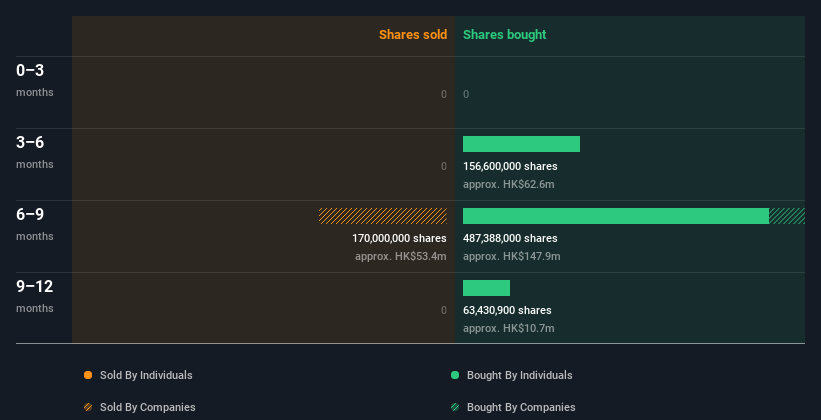
Huili Resources (Group) Limited (HKG:1303) insiders who purchased shares in the last 12 months were richly rewarded last week. The stock climbed by 33% resulting in a HK$292m addition to the company’s market value. As a result, their original purchase of CN¥189.6m worth of stock is now worth CN¥376.5m.
Although we don't think shareholders should simply follow insider transactions, we would consider it foolish to ignore insider transactions altogether.
See our latest analysis for Huili Resources (Group)
Huili Resources (Group) Insider Transactions Over The Last Year
Over the last year, we can see that the biggest insider purchase was by insider Chin Chung Bong for HK$63m worth of shares, at about HK$0.40 per share. We do like to see buying, but this purchase was made at well below the current price of HK$0.60. While it does suggest insiders consider the stock undervalued at lower prices, this transaction doesn't tell us much about what they think of current prices.
While Huili Resources (Group) insiders bought shares during the last year, they didn't sell. The average buy price was around HK$0.30. We don't deny that it is nice to see insiders buying stock in the company. However, you should keep in mind that they bought when the share price was meaningfully below today's levels. You can see a visual depiction of insider transactions (by companies and individuals) over the last 12 months, below. If you click on the chart, you can see all the individual transactions, including the share price, individual, and the date!

There are plenty of other companies that have insiders buying up shares. You probably do not want to miss this free list of undervalued small cap companies that insiders are buying.
Insider Ownership
Many investors like to check how much of a company is owned by insiders. Usually, the higher the insider ownership, the more likely it is that insiders will be incentivised to build the company for the long term. Insiders own 40% of Huili Resources (Group) shares, worth about HK$463m. While this is a strong but not outstanding level of insider ownership, it's enough to indicate some alignment between management and smaller shareholders.
So What Do The Huili Resources (Group) Insider Transactions Indicate?
It doesn't really mean much that no insider has traded Huili Resources (Group) shares in the last quarter. However, our analysis of transactions over the last year is heartening. Judging from their transactions, and high insider ownership, Huili Resources (Group) insiders feel good about the company's future. So while it's helpful to know what insiders are doing in terms of buying or selling, it's also helpful to know the risks that a particular company is facing. Be aware that Huili Resources (Group) is showing 4 warning signs in our investment analysis, and 2 of those are potentially serious...
Of course, you might find a fantastic investment by looking elsewhere. So take a peek at this free list of interesting companies.
For the purposes of this article, insiders are those individuals who report their transactions to the relevant regulatory body. We currently account for open market transactions and private dispositions of direct interests only, but not derivative transactions or indirect interests.
Have feedback on this article? Concerned about the content? Get in touch with us directly. Alternatively, email editorial-team (at) simplywallst.com.
This article by Simply Wall St is general in nature. We provide commentary based on historical data and analyst forecasts only using an unbiased methodology and our articles are not intended to be financial advice. It does not constitute a recommendation to buy or sell any stock, and does not take account of your objectives, or your financial situation. We aim to bring you long-term focused analysis driven by fundamental data. Note that our analysis may not factor in the latest price-sensitive company announcements or qualitative material. Simply Wall St has no position in any stocks mentioned.
Have feedback on this article? Concerned about the content? Get in touch with us directly. Alternatively, email editorial-team@simplywallst.com